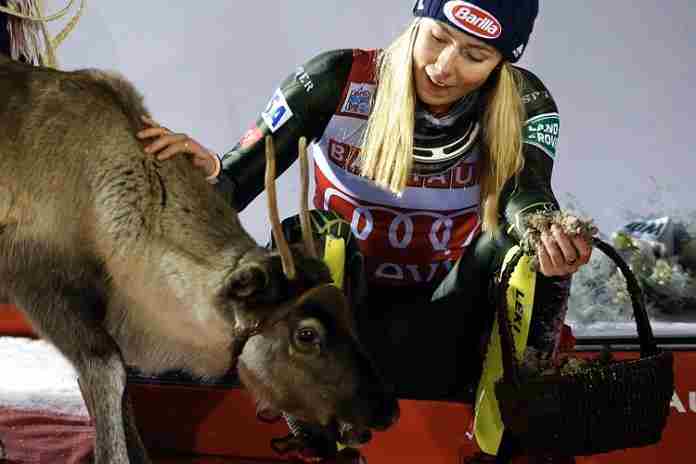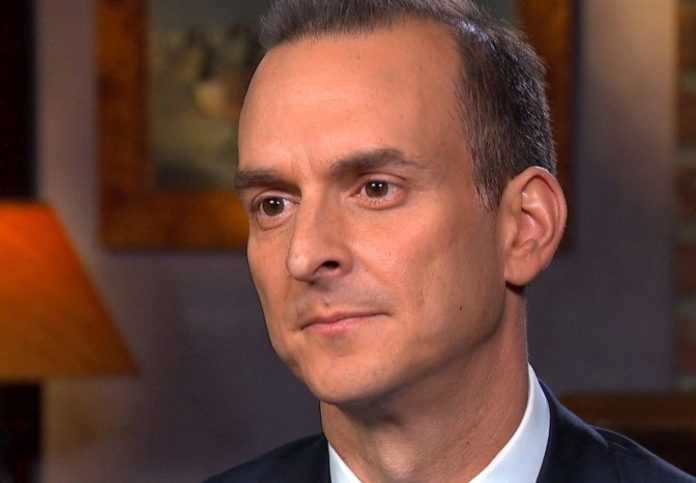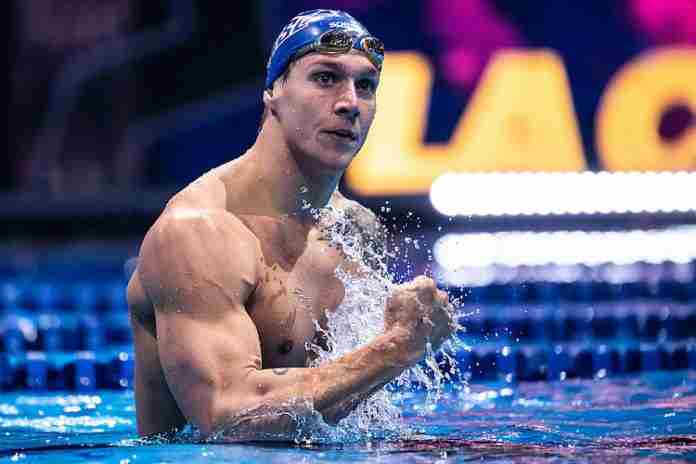The latest news, notes and quotes from the worldwide Five-Ring Circus:
● Games of the XXXII Olympiad: Tokyo 2020 ● International Olympic Committee President Thomas Bach completed a four-day visit to Tokyo, met Japanese Prime Minister Yoshihide Suga, saw the Athlete’s Village and the new Olympic Stadium, gave some comments to reporters and left.
Bach did meet with Australian Prime Minister Scott Morrison on Tuesday (18th); Morrison was in Japan to meet with Suga. Morrison underscored the interest of Queensland to host the 2032 Games, for which discussions have continued, but any actions have been stopped by the pandemic.
There was other news.
A three-day meeting of the IOC Coordination Commission with the Tokyo organizers resulted in further anti-virus steps for the Games, including a request for social distancing in the Olympic Village and asking athletes to limit their stays in the Village.
Said Coordination Commission Chair John Coates (AUS), “The number of athletes is not going to reduce, that will be the same. Staying longer in the village increases the potential for problems.”
● Olympic Winter Games ● The Salt Lake City-Utah Committee for the Games continued its march toward a future OWG bid with the release of a letter to IOC President Bach on 30 October and a quick reply, welcoming their interest.
The committee met on Tuesday (17th) and shared their letter and Bach’s response, which noted the full set of existing venues that are continuously used for world-class events and:
“It is also very promising to see that the project to bring future Olympic Winter Games to Salt Lake City enjoys political support at all levels and has such high public support.”
It’s highly unlikely that the 2030 Winter Games would be held there, given that the Los Angeles will host the Olympic Games in 2028. But 2034 looks very good.
¶
The tug-of-war within Italy over control of spending for Olympic programs in that country were further muddied this week after Sports Minister Vincent Spadafora wrote to IOC chief Bach that the IOC’s concerns over the independence of the Italian National Olympic Committee (CONI), including
“The framework recognizes that CONI, with extreme clarity and as perhaps isn’t the case in many other countries, has all the functions it is due according to Article 27 of the Olympic Charter.”
However, The Associated Press reported that “CONI president Giovanni Malago said earlier Tuesday that ‘it doesn’t seem that the problems have been solved.’”
At the extreme end of the possible sanctions could be a suspension of the country for the Tokyo Games or even the removal of the hosting rights for the 2026 Winter Games.
● Athletics ● American triple jump star Omar Craddock was placed on the “Provisional Suspensions” list by the Athletics Integrity Unit on 13 November for “whereabouts” failures.
According to the AIU:
“Under the World Athletics Anti-Doping Rules, any combination of 3 whereabouts failures (Filing Failure and/or Missed Test) within a period of 12 months constitute an anti-doping rule violation, for which the applicable sanction is 2 years’ ineligibility subject to a reduction to a minimum of 1 year depending on your degree of fault.”
Craddock, 29, made the U.S. team for three outdoor World Championships, in 2013, 2015 and 2019, finishing fourth in 2015. He won the 2019 Pan American Games TJ and with a lifetime best of 17.68 m (58-0 1/4) from 2019, he is a serious contender for the 2020 Olympic Team. That is now in doubt.
¶
Another chapter in the Kemoy Campbell story is happily closed, with the Jamaican government stepping in to pay the remaining roughly $71,000 on his medical costs after his near-death experience in 2019 while pace-setting at the Millrose Games in New York.
Campbell fell off the track and was taken to a nearby hospital and was eventually revived and received an implantable cardioverter defibrillator. After another incident, he was fitted with a pacemaker. He retired from competition in September of 2019.
A 2016 Olympian for Jamaica in the 5,000 m (bests of 13:14.45 indoors ‘17; 13:20.39 outdoors in 2015), Campbell’s medical bills surpassed $100,000, for which he had some personal insurance, plus $31,677 from the Jamaica Athletes Insurance Plan. But about $7,000 remained, with the Jamaican Ministry of Culture, Gender, Entertainment and Sport stepping in.
“The Ministry felt duty bound to assist Kemoy,” said Minister Olivia Grange.
“He has performed well for Jamaica and in fact, as we know, he fell ill on the track. And so, the least we could do to show appreciation and gratitude to him was to assist in his time of need.”
¶
South Africa’s double Olympic 800 m champion Caster Semenya will now take her appeal of the decision of the Court of Arbitration for Sport, which affirmed the World Athletics regulations for women with high testosterone levels in events from 400 m to the mile, to the European Court of Human Rights.
Her attorney, Greg Nott, confirmed the appeal: “We remain hopeful that World Athletics will see the error it has made and reverse the prohibitive rules which restrict Ms Semenya from competing.”
World Athletics noted in a statement that both the Court of Arbitration for Sport (CAS) and the Swiss Federal Tribunal had approved of the regulations already:
“In its decision in early September, the SFT concluded, ‘Based on these findings, the CAS decision cannot be challenged. Fairness in sport is a legitimate concern and forms a central principle of sporting competition. It is one of the pillars on which competition is based. The European Court of Human Rights also attaches particular importance to the aspect of fair competition. In addition to this significant public interest, the CAS rightly considered the other relevant interests, namely the private interests of the female athletes running in the ‘women’ category’.”
Semenya has indicated she will attempt to make the South African team for Tokyo in the 200 m, an event not impacted by the World Athletics regulations.
● Basketball ● The new National Basketball Association schedule could run as late as 22 July 2021, which would make it extremely unlikely that players on either of the final two teams could participate in the Tokyo Games.
Given the pandemic-driven late finish of the 2020 season – into October – the 2020-21 schedule will open on 22 December with a 72-game regular season, then play-in games for the playoff rounds prior to the traditional playoff format.
The Tokyo Games open on 23 July and while it is possible that players on the final two teams could rush to join their national teams at the Games, would they? It’s a headache that national teams are going to have to solve, not just at the last moment, but in assembling their teams and including more alternates (and the accompanying flights, equipment and rooms).
● Figure Skating ● The ISU Grand Prix will continue this week with the Rostelecom Cup in Moscow (RUS), featuring primarily Russian skaters with others from nearby countries.
Among the entries are European Champions Dmitri Aliev (RUS), Alena Kostornaia (RUS), Aleksandra Boikova and Dmitrii Kozlovskii (RUS/Pairs) and Victoria Sinitsina and Nikita Katsalapov (Ice Dance/RUS).
The ISU Grand Prix Final, scheduled to be held in Beijing (CHN) on 10-13 December, has been canceled due to the pandemic, although a replacement site with new dates is possible.
● Football ● FIFA announced two initiatives, for women’s football and for coaches from its Football Stakeholders Committee:
● Minimum labor conditions for female players, including 14 weeks for maternity leave, suitable facilities for reintegration into her team upon return, temporary addition of a replacement player during maternity and protection from dismissal due to pregnancy.
● Clarity of contracts for coaches, including termination payments and overdue payments.
These provisions will be forwarded for final approval to the FIFA Council in December.
● Ice Hockey ● The International Ice Hockey Federation (IIHF) Council received a comprehensive report on the status of its 2021 Men’s World Championship, scheduled to be held in Minsk (BLR) and Riga (LAT) from 21 May-6 June.
The continuing political protests in Belarus and the disinterest of the Latvian government to co-host with Belarus have roiled the preparations. The IIHF statement noted:
“[IIHF President Rene] Fasel emphasized that based on the report the IIHF questions whether the tournament in Minsk/Riga can be played if the current situation remains as it is presently, but equally that the IIHF cannot be put in a position where it is unable to deliver a World Championship. He agreed together with the Council that more time would be needed to review the situation and decide on the best course of action. …
“‘We will take what we learned, go back to the organizing committees and the governments and find the best way forward for the IIHF and its members.’”
● Skiing ● American superstar Mikaela Shiffrin is ready to go in her first competitive race in 300 days at the FIS Alpine World Cup stop in Levi, Finland.
Located above the Arctic Circle, the site annually hosts a Slalom for men and women, with one of the best gimmicks in sport: each winner is “awarded” a reindeer, which they don’t get to keep, but get to name.
Shiffrin has “won” four reindeer, which she has named Rudolph, Sven, Mr. Gru and Ingemar.
Shiffrin was well on her way to a fourth straight Alpine World Cup overall title in the 2019-20 season, but abandoned the tour after the unexpected death of her father, Jeff, on 3 February 2020. She was ready to come back for the World Cup Finals, but the races were called off due to the coronavirus pandemic. She skipped the World Cup season opener at Soelden (AUT) due to a back injury. But she appears to be ready to go for Levi.
● Swimming ● The International Swimming League final is on this weekend, bringing to a close a frantic month of swimming in the short-course pool at the Duna Arena in Budapest, Hungary.
All of the swimmers have been sequestered in Budapest for the duration, but the original 10 teams are down to four for the final: defending champion Energy Standard, defending runner-up London Road, the undefeated Cali Condors and L.A. Current.
In the only match between them this season – the opener back on October 16-17 – the Condors stomped on Energy Standard and the L.A. Current by 567.0-463.0-420.0. The Condors are led by sprint superstar Caeleb Dressel, the runaway leading scorer with 367.5 seasonal points, ahead of sprinter Beryl Gastaldello (L.A. Current/France: 296.0) and backstroker Ryan Murphy (L.A. Current/USA: 292.5). Breaststroke star Lilly King (Condors/USA) was undefeated for most of the first two seasons of the league and has 279.0 points, fourth best in the league this season. She will be favored in the 50-100-200 Breast events, but will face stiff competition from Molly Hannis (USA) and Alia Atkinson (JAM).
The final is scheduled for 8-10 a.m. Eastern time on Saturday and 12-2 p.m. Eastern on Sunday, on either CBS or the CBS Sports Network.
¶
ISL has been plagued with complaints of non-payment to its suppliers, including the news agency LaPresse for the 2019 season, and the withdrawal of two executives, head of commercial operations Hubert Montcoudiol and Jean-Francois Salessy, general manager of the Energy Standard Paris team.
SportBusiness reported Thursday that television partner IMG is also owed money from the first season for its television production work. It is not involved in the TV effort for this season. The report noted:
“It is understood that a six-figure sum (in pounds sterling) remains unpaid with only a portion of the payment having been settled for IMG’s provision of outside broadcast facilities and personnel.
“The development comes after LiveWire Sport, the UK-based digital content agency, said recently that it was considering legal action over missed payments by the ISL, claiming that the swimming league fell behind on instalments in December last year and still owes a six-figure sum.”
Could this weekend’s seasonal final be the last of the ISL experiment?
● United States Olympic & Paralympic Committee ● A potentially important new athlete-sponsorship connector was unveiled by the USOPC this week, called the “Athlete Marketing Platform,” designed to better present possible athlete engagements to sponsors and suppliers.
It is described as a pilot program and “an opt-in [digital marketplace] program that connects Team USA sponsors and licensees directly with athletes, providing incremental revenue opportunities and marketing exposure for Team USA athletes.”
The program will begin in January and
“Athletes who opt in to participate in the pilot in 2021 will benefit from the unprecedented and compressed window encompassing the Tokyo and Beijing Olympic and Paralympic Games, and will receive a guaranteed payment in exchange for their commitment to shape the program and participate in group marketing.”
This is a really interesting concept, and could spread well beyond the USOPC umbrella, potentially in a revised form to the NCAA’s Name-Image-Likesness compensation concepts for college athletes. But it has yet to be proven; 2021 can’t come soon enough!
● The Last Word ● The International World Games Association (IWGA) held its first-ever Annual General Meeting by video conference on 6 November, underlining its support for the IOC’s Agenda 2020 concepts. Most important among these:
“[T]he leading, sustainable, principle of The World Games remains that host cities are not required to build new facilities. The maximum number of athletes will be raised from 4200 to 5000, and the invitational sports programme will be replaced with a more flexible display programme. Additionally, the IWGA will move towards financially supporting the International Federations taking part in The World Games.”
That last sentence is extremely significant and is new, with the World Games Association celebrating its 40-year anniversary; 2021 will mark the 40-year anniversary of the World Games itself, first held in Santa Clara, California in 1981.
In Birmingham, Alabama, the site of the 2022 World Games, the organizing committee’s online store opened, with 18 items in the men’s section, 11 in the women’s department and four items for youth. The most fashionable item was clearly the Women’s Mountainside Heavyweight Sherpa coat at $107.95, but does it really get cold enough to wear this in Alabama?
You can receive our exclusive TSX Report by e-mail by clicking here. You can also refer a friend by clicking here, and can donate here to keep this site going.
For our 526-event International Sports Calendar from October 2020 to June 2021, by date and by sport, click here!

























